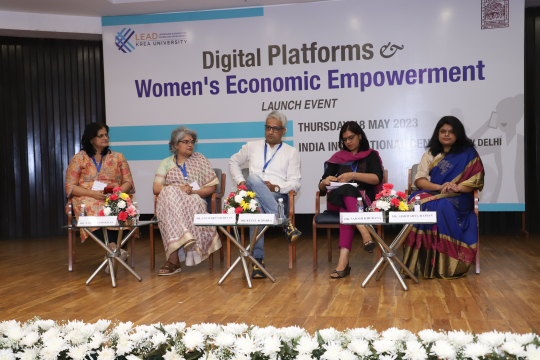A launch event for the initiative Digital Platforms and Women’s Economic Empowerment (DP-WEE) was held on 18 May 2023 in New Delhi. The aim of the initiative is to enable women to engage productively with the platform economy in India.
The initiative is funded by the Bill & Melinda Gates Foundation and housed at CECFEE (Centre for Research on the Economics of Climate, Food, Energy and Environment) at Indian Statistical Institute (ISI) Delhi Centre and LEAD at Krea University.
Defining features of platforms
With 80-90% of India’s workforce being informal, the experts explained that ‘gig’ work is not the defining feature of platforms – instead, it is the interlay of workers and consumers, and the enormous amounts of information made available in a readily usable form. While platforms are largely an urban phenomenon so far, infrastructure investment can enable women in rural/peri-urban areas to make products close to home and tap platforms that create marketplaces.
The team, led by Farzana Afridi (ISI), presented ongoing and planned work under the initiative. This was followed by a panel discussion with experts from research, industry, and policy. They discussed the promise and challenge of digital platforms[1] from a gender perspective. The panel comprised Gayathri Vasudevan (LabourNet), Ketul Acharya (Independent Consultant), Sakshi Khurana (NITI Aayog) and Aishwarya Raman (OMI Foundation) and was moderated by Yamini Atmavilas (Udaiti Foundation).
Gender division shows on platform
The speakers contended that although platforms do not distinguish among workers of different genders per se, the cost of sourcing female workers is higher, calling for financial incentives for businesses.
The gendered division in traditional work is also reflected in the platform sector – women are mainly engaged in beauty services rather than faster-growing segments of mobility or delivery. For women on platforms, work is no longer a binary choice between household duties and economic aspirations, and there are opportunities to flexibly take advantage of shared assets like vehicles and mobiles. Platforms are taking steps to enhance women’s financial empowerment, such as by providing cash flow-based lending. Yet, there is low awareness of this type of work among those not on platforms.
Bridging gaps to empower women
The panelists drew attention to the need to close gender gaps in digital and future-relevant skills, and for skilling to work hand-in-hand with job platforms. Given that for platform workers the city is the workplace, it is important to address issues of women’s safety, mobility, and access to public toilets. Research and policy ought to consider how to strengthen networking and mentorship among workers and improve their bargaining power vis-à-vis a ‘faceless’ employer.
Can help women progress in the platform sector
On portals that match jobseekers and employers, there are challenges such as large volumes of applications and a need to resort to AI for screening, verifiability of candidates, fraudulent job postings, and so on. The panel recommends such job portals to offer integrated end-to-end solutions including say, counseling for job readiness.
The experts emphasized the need for generating multidimensional, real-time data on platforms, which can be used to develop newer solutions. They also highlighted the scope for research to gain insights into the potential of platforms for women and contended that DP-WEE can make important contributions in these areas.
Farzana Afridi shared that DP-WEE aims to analyze and loosen constraints around women’s engagement with platforms. The researchers will test interventions for women’s skilling, enabling them to join and progress in the platform sector. The team will seek to understand women’s job preferences and how they search for jobs – and undertake interventions to bridge asymmetries. Advocacy efforts will be made to improve women’s spatial and digital mobility, and with regard to legal frameworks to enhance the quality of work for women on platforms.
Facts - digital labor platforms
The International Labour Organization (2021) broadly categorizes digital labor platforms into online web-based (where tasks are performed online or remotely, e.g. video transcription) and location-based ones (e.g. taxi, delivery, or home services). The ILO also defines two types of work relationships offered by platforms, namely internal employment wherein workers are directly hired, or external employment mediated through the platform, viz. employer-employee matching.
The platform sector began expanding in India about a decade ago. NITI Aayog (2022) estimates that in 2020-21, 7.7 million workers, or 1.5% of India’s workforce, were engaged in the gig economy.
By: Nalini Gulati (Communications Manager, DP-WEE) and Sneha Ganguly (Project Manager, DP-WEE)
